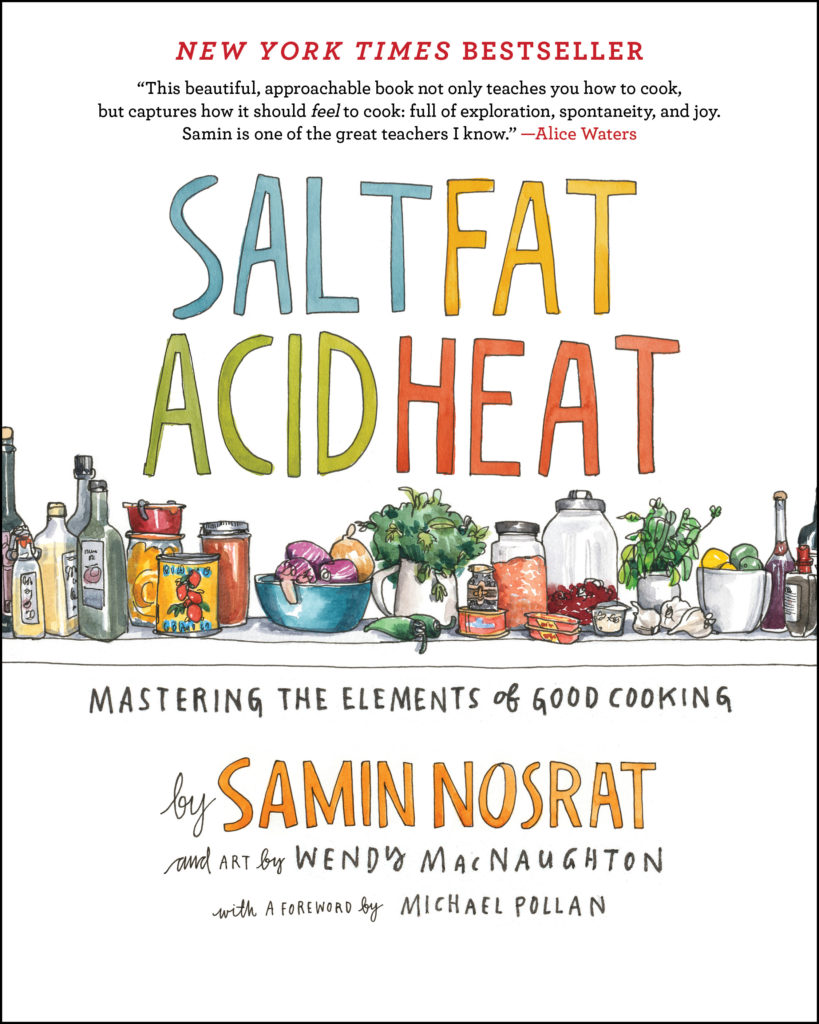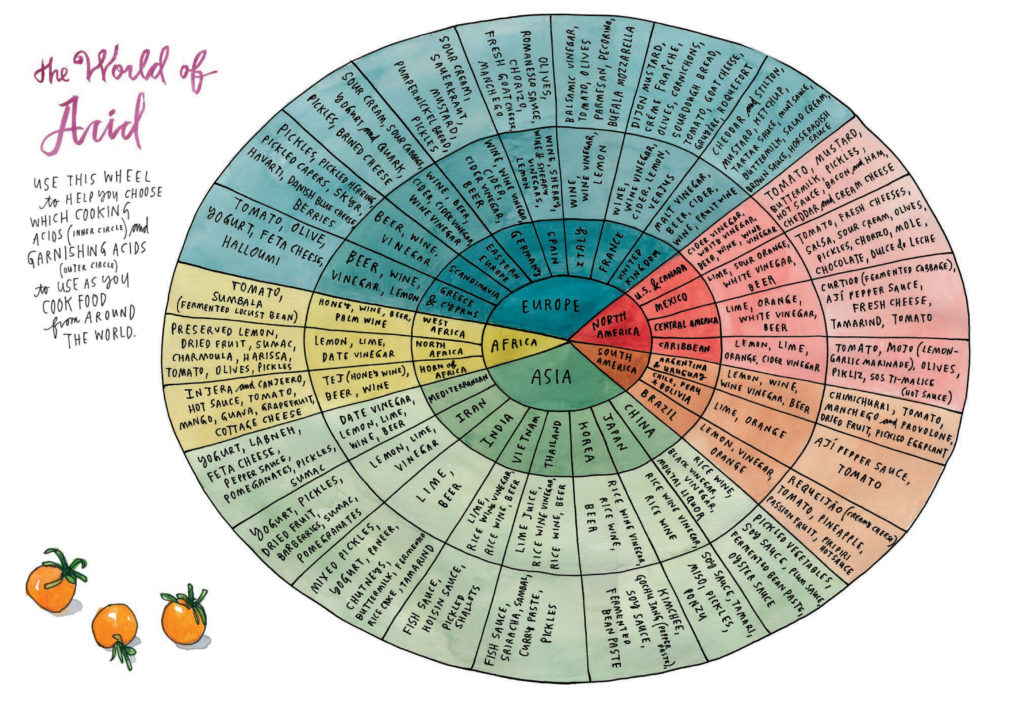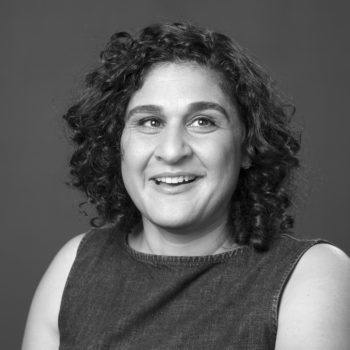Brendan Francis Newnam: Each week you send in your questions about how to behave, and here to answer them this time… is celebrated chef and cooking teacher Samin Nosrat.
Her first-ever fine dining meal was at the famed restaurant Chez Panisse in Berkeley, and almost immediately thereafter, Samin dropped everything to work there. She went on to spend a decade absorbing everything she could at Panisse and other eateries. That led her to a whole new way of thinking about of cooking and teaching it to others. She calls the method “Salt, Fat, Acid, Heat” — which is also the name of her new quasi-cookbook. Samin, welcome!
Samin Nosrat: Oh, thanks for having me, you guys.
On how she developed the concept for her book

Rico Gagliano: Thank you for joining us! Let’s talk about this manual. Normally, a cooking manual is built around recipes, but recipes are kind of secondary here.
Samin Nosrat: Well, it’s sort of a manifesto of my cooking philosophy, which I came to after working at Chez Panisse for a few years and trying to make sense of what we were doing because the menu there changes every day. They never refer to cookbooks or recipes or anything, and I came there knowing nothing.
And eventually I saw this pattern, and I realized, “Oh, wow! No matter what food we’re making, there’s sort of these four elements that are always at the foundation of whatever we make.” It’s about knowing how to use salt and fat and acid and heat and control these four things, and I turned it into a book.
Brendan Francis Newnam: If you had to write an abridged version of this book that contained only one of the four elements. What is your favorite element at the moment and why?
Samin Nosrat: Oh, for sure, right now, my favorite is acid. And I think it’s because… Well, my family’s from Iran, and so our palates skew toward the acidic really intensely–
Rico Gagliano: Things like vinegar, wine.
Samin Nosrat: Yeah, fermented things. A lot of yogurt and cheese and pickles. And we have fruit leathers, but all of our fruit leathers are extraordinarily sour. To me, food is really not complete until it makes you have a little tang experience.

On a type of Persian etiquette known as ta’arof
Brendan Francis Newnam: So, we’re going to get to our listeners’ etiquette questions in a second, but before we start, I wanted to ask you a question. Before we were taping, you mentioned this Persian etiquette concept called — and I may be mispronouncing it — ta’arof.
Samin Nosrat: Ta’arof, ta’arof. I’m so glad you brought it up because I was going to bring it up.
Brendan Francis Newnam: Yeah, can you explain the basics of it?
Samin Nosrat: Yeah. So, it’s at the base of all Iranian interaction, basically, is ta’arof, which is so messed up, you guys. Like, I’m in deep, deep amounts of therapy because of ta’arof.
So, the concept is basically always offering anything to your guests. If anybody shows up, the rule is you must be completely generous and open and share everything that you have with them. If someone comes to your house, you invite them in, even if you don’t have anything ready. And you’ll make many dishes and share it with them.
The first time I went to Iran, I was 14 years old, and I had grown pretty well trained in it, but maybe not with all of the nuance. And we went deep into the mountains and met some very extended family. And I had this cousin who was wearing — a distant cousin — who was wearing a really beautiful bracelet, and I said, “Wow, your bracelet is so beautiful!” And she took it off and had to give it to me. Like, that was the rule dictated.
And I had no idea. I was so embarrassed. I didn’t know what to do, and these were really poor people. And so, I was like, “What do I do?!?” It was very traumatic.
Brendan Francis Newnam: Yeah, too bad she didn’t like anything you were wearing.
Samin Nosrat: I know!
Rico Gagliano: “And I’ll take your wedding ring!”
Brendan Francis Newnam: You’re like, “It’s a deal.”
Rico Gagliano: Well, let’s see, maybe you can apply some of those tenets to these questions, or maybe you can just–
Brendan Francis Newnam: Or maybe this can be an extension of your therapy, and you can throw those aside. And just tell us how you feel off the cuff.
Samin Nosrat: We’ll see.
Learning to let go in the kitchen
Rico Gagliano: Let’s try it. Here’s something from K in Brooklyn. I love this question. Kay writes, “What do you do when you’re cooking with a friend, a family member, or a significant other, but they’re doing it all wrong?”
Samin Nosrat: Oh, my God, K.
Rico Gagliano: Yeah, “Like not letting baking ingredients come to room temperature or allowing enough time for salting the meat. How do you make sure your meal is still delicious without damaging the relationship?”
Samin Nosrat: Oh, this is intense.
Rico Gagliano: And it can happen. That can happen.
Samin Nosrat: Oh, I’ve been that mean. I went through a whole phase where I was, like, the kitchen terrorist, and no one would come cook with me [laughs]. Yeah. It was pretty intense.
And then, I went through a whole second phase. This might be the best answer for you, K, is do things behind their back. I did a lot of salting — adding salt to the pasta water when no one was looking. And then people would sit down to this delicious meal, and they’d be like, “Why is this so good?” “I don’t know!”
Brendan Francis Newnam: But you can’t un-salt something. You can only add salt. What if someone’s doing something that is, you know, irreversible?
Samin Nosrat: I think there is a point at which everyone’s experience of the meal has to come first. I would say there is a point at which, when someone’s doing something really wrong or, frankly, dangerous, those are times when I’ll say, “Hey, let me just show you.”
But it is a really tricky thing. Like, I was dating a guy once who really didn’t want me to be the person who knew more in the kitchen, which was hard because I was the person who knew more in the kitchen [laughs].
Rico Gagliano: Yeah, like, “Why are you dating a chef?!” That’s amazing.
But how do you negotiate that when they’re like, “No, actually, this does require four pounds of salt. Sorry.”
Samin Nosrat: Well, I think one great way — if people are really being very difficult — I’ll often say, “Hey, let’s do a little bit of it both ways, so we can see which one we like better.” I’m really a fan of the side-by-side tasting because, also, everyone’s palate isn’t the same.
So, that isn’t always an option, if they want to put cold butter in a cake or something. But I often will try and offer a compromise where we can have a little bit of things both ways. And then, this is– I don’t know why you brought me in as the etiquette expert because I have a horrible temper [laughs].
Rico Gagliano: Really?
Samin Nosrat: Yeah.
Brendan Francis Newnam: I think sometimes that’s what it requires. Don’t you think it’s a little bit — your ego gets entwined?
Samin Nosrat: Totally. And the other thing I’ll say is I, over the years, have really– you know I’m exaggerating. I’m not going to stab anyone when they come to my house, I promise.
I have reached a point where, for me, cooking together and eating together is about so much more than how the food tastes. It’s about the experience of coming together around the table. If things aren’t perfect, it’s fine. It’s OK.
Brendan Francis Newnam: K, I think you have a series of answers there, the ultimate one being: do not stab anyone.
Rico Gagliano: Sure.
Brendan Francis Newnam: Oh, and also, don’t date jerks who think they know more than you.
Rico Gagliano: There you go, K.
Is it OK to mock photo-snapping foodies?
Brendan Francis Newnam: Our next question comes from Aaron in Houston, Texas. And Aaron writes, “Is it acceptable yet to directly mock people at restaurants who get carried away with taking pictures of their food instead of, you know, eating it? (Please say yes. This has gotten way out of hand.)”
Samin Nosrat: Ugh, it’s so epic, man. Because that’s me. I’m internally mocking all of those people [laughs]. But I also feel like I don’t think it’s acceptable. Ultimately, I think you want to treat people like…
Rico Gagliano: To mock?
Samin Nosrat: Yeah, I don’t think it’s acceptable to mock.
Brendan Francis Newnam: But as a chef, are you proud when people take pictures of your food? Or are you just like, “Hey, that’s not the point of the food!”
Samin Nosrat: No. No, I want them to eat the food. Because, also, as a cook, I rarely take pictures of things in restaurants because, you know what? Most restaurants have real bad lighting. Real bad. And so, your Instagram’s just not going to turn out that good [laughs].
Brendan Francis Newnam: Sorry, Aaron. I was trying to help you out, but it sounds like no mocking, but secretly, you’re right.
Samin Nosrat: Sorry, Aaron. Save it for therapy!
Brendan Francis Newnam: That’s the secret of being an adult, right there. You’re right, just don’t say anything.
Rico Gagliano: Yep! And save it for therapy.
Is it OK to eat raw beef? (Don’t sue Samin!)
Rico Gagliano: Here is something from Mack, who wrote in via our website. This isn’t exactly an etiquette question, but it is germane to the conversation. He writes, “So, I have found I like the taste of raw beef. Is there a safe way to eat this? I have a trusted meat guy, but I still feel like this is not a good idea. Thanks.”
Samin Nosrat: Oh… am I going to get sued, you guys?
Brendan Francis Newnam: No. This is Samin Nosrat answering the questions.
Rico Gagliano: Samin’s opinions are wholly her own and not those of American Public Media.
Samin Nosrat: I definitely think that you can eat your meat raw if you know where it comes from, if you take care of it, if you serve it chilled, if you keep it cold, and maybe if you feed it to some other people first and notice that they don’t die.
Rico Gagliano: That’s always a good experiment to conduct.
Brendan Francis Newnam: That’s the important thing. I love that the subtext of this Mack question is: he found that he likes the taste of raw beef before having any of these questions answered. Like, he started eating it on his own, and then he still feels like it’s not a good idea. Therapy is a theme for this conversation, but he sounds like he has a low-level death wish here.
Rico Gagliano: So, Mack, you have a variety of answers and non-answers in there.
Samin Nosrat: Yeah, that’s true.
Brendan Francis Newnam: Samin, thank you so much for telling our audience how to behave.
Samin Nosrat: I really hope they don’t listen to me. Thanks for having me, you guys.
Brendan Francis Newnam: We thank you and your therapist.


